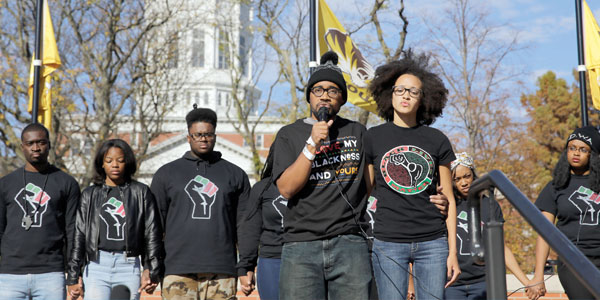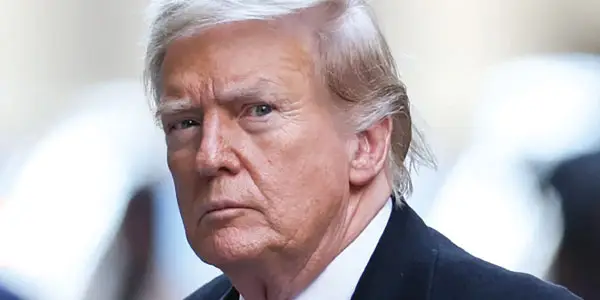Después de una reestructura administrativa en la Universidad de Missouri-Columbia (MU), parece que MU jugará contra Brigham Young University a las 6:30 p.m. el sábado 14 de noviembre en el estadio Arrowhead como está programado.
Como se reportó extensamente, los miembros del equipo de fútbol realizaron una breve huelga de practicar o jugar en apoyo a Concerned Student 1950. Nombrado en recuerdo de cuando MU se hizo racialmente integrada (1950) el grupo está tratando de atender los problemas raciales en MU.
En un documento con fecha del 20 de octubre, el grupo entregó ocho exigencias a la universidad, incluyendo “el retiro inmediato de Tim Wolfe como presidente del sistema de MU”, con una fecha límite del 28 octubre para que la universidad satisfaciera sus demandas. La demanda de la renuncia de Wolfe surgió a raíz de una confrontación el 10 octubre entre activistas estudiantiles y Wolfe durante un desfile en MU, durante el cual Wolfe presuntamente permitió “que su chofer le pegara a uno de los manifestantes”.
Como se declaró recientemente por el comentador de Sports Illustrated, Bill Connelly, los representantes de Concerned Student 1950 presuntamente hablaron con un jugador anónimo de fútbol de MU el 4 de noviembre. Es de suponer, que la reunión era para conseguir el apoyo del equipo para Concerned Student 1950. El 7 de noviembre, los miembros del equipo anunciaron que estaban absteniéndose de actividades relacionadas con el fútbol para apoyar a Jonathan Butler. Butler, un estudiante africano americano graduado en MU y miembro de Concerned Student 1950, estaba ejecutando una huelga de hambre para apoyar las peticiones de Concerned Student 1950, particularmente la demanda por la renuncia de Wolfe.
Algunos jugadores se negaron a participar; sin embargo, muchos estuvieron de acuerdo en ponerse en huelga, como también ha sido reportado ampliamente. La historia de USA Today reveló un total de 32 jugadores en huelga.
El domingo 8 de noviembre, el entrenador de MU, Gary Pinkel expresó apoyo hacia sus jugadores en huelga con dos formas de comunicación -un mensaje mediante su página oficial en Twitter y una declaración. El mensaje incluía una foto del equipo con la siguiente leyenda: “La familia Mizzou se levanta como uno. Estamos unidos. Respaldamos a nuestros jugadores #ConcernedStudent1950 GP.”
En su declaración, Pinkel anunció que “no habría entrenamiento de fútbol ni actividades formales del equipo” el domingo. El entrenador también comentó que era “claro” para él seguir a un equipo que sus jugadores que hacían el boicot no “planeaban regresar a entrenar hasta” que se terminara la huelga de hambre de Butler.
La huelga de los jugadores –y la huelga de hambre de Butler – terminó el lunes 9 de noviembre cuando renunció Wolfe. En noticias relacionadas, R. Bowen Loftin renunció como rector de la Universidad de Missouri –Columbia, el campus principal de los cuatro campus del sistema de la Universidad de Missouri.
“He pensado y rezado sobre esta decisión”, dijo Wolfe durante una conferencia de prensa el lunes. “Es la decisión correcta”.
(Nota: el video del anuncio de Wolfe está accesible en línea mediante este enlace –
http://abcnews.go.com/US/university-missouri-president-tim-wolfe-resigns-amid-protests/story?id=35076098.)
Pinkel habló sobre los cambios inesperados -particularmente el boicot de sus jugadores y su relación con la huelga de hambre de Butler – durante una conferencia de prensa el lunes. Sports Radio 810 WHB in Kansas City, Mo., estuvo entre los medios de comunicación que transmitieron la conferencia de prensa.
Durante la conferencia de prensa, un reportero le preguntó a Pinkel que tan frecuentemente “los jugadores africano americanos o los demás” le habían comentado a su entrenador de que no se sentían “cómodos en la Universidad de Missouri”. Pinkel dijo que había sucedido solamente “una, dos o tres veces”. Como parte de su respuesta, el entrenador también reconoció que existen los problemas raciales en MU y expresó optimismo por el futuro.
“Podemos aprender de esto y, pienso. Cambiarlo hacia algo positivo (para MU)”, dijo él.
___________________________________________________________________________________________________________
MU back to playing football after administrative shakeup
Compiled by the Dos Mundos Sports Staff
After an administrative shakeup at the University of Missouri-Columbia (MU), it appears that MU will play it its football game with Brigham Young University at 6:30 p.m. on Saturday (Nov. 14) at Arrowhead Stadium as scheduled.
As has been widely reported, members of the football team staged a brief strike from practicing or playing games in support of Concerned Student 1950. Named in remembrance of when MU became racially integrated (1950), the group is trying address race issues at MU.
In a document dated Oct. 20, the group submitted eight demands to the university, including “the immediate removal of Tim Wolfe as UM system president,” with an Oct. 28 deadline for the university to meet its demands. The demand for Wolfe’s resignation stemmed partly from an Oct. 10 confrontation between student activists and Wolfe during MU’s homecoming parade, during which Wolfe reportedly permitted “his driver to hit one of the demonstrators.”
As was stated recently by Sports Illustrated commentator Bill Connelly, Concerned Student 1950 representatives reportedly talked to an anonymous MU football player on Nov. 4. Presumably, the meeting was to get the team’s support for Concerned Student 1950. On Nov. 7, team members announced they were refraining from football-related pursuits to support Jonathan Butler. Butler, an African American graduate student at MU and Concerned Student 1950 member, was staging a hunger strike to support Concerned Student 1950’s demands, particularly the demand for Wolfe’s resignation.
Some players refused to get involved; however, many agreed to strike, as also has been widely reported. A USA Today story put the total of striking players at 32.
On Sunday (Nov. 8), MU coach Gary Pinkel expressed support for his striking players with two forms of communication – a tweet on his official Twitter page and a statement. The tweet included a team photo, with the following caption: “The Mizzou Family stands as one. We are united. We are behind our players. #ConcernedStudent1950 GP.” During an interview Tuesday evening (Nov. 10) on Sports Radio 810 WHB’s “Between the Lines,” Pinkel told program host Kevin Kietzman that the Concerned Student hashtag shouldn’t have been included in the tweet made on his behalf.
In his statement, Pinkel announced there would “be no football practice or formal team activities” on Sunday. The coach also commented that it was “clear” to him following a team that his boycotting players didn’t “plan to return to practice until” Butler’s hunger strike was over.
The players’ strike – and Butler’s hunger strike – ended on Monday (Nov. 9), when Wolfe resigned. In related news, R. Bowen Loftin resigned as chancellor of the University of Missouri-Columbia, the main campus of the four campuses in the University of Missouri System.
“I have thought and prayed about this decision,” Wolfe said during a press conference Monday. “It’s the right thing to do.”
(Note: Video of Wolfe’s announcement is accessible online, including through this link – http://abcnews.go.com/US/university-missouri-president-tim-wolfe-resigns-amid-protests/story?id=35076098.)
Pinkel discussed the recent turn of events – particularly his players’ boycott and its relationship to Butler’s hunger strike – during a press conference on Monday. Sports Radio 810 was among the media outlets that carried the press conference.
During the press conference, one reporter asked Pinkel how frequently “African American players (or) whatever” had commented to their coach that they didn’t “feel comfortable at the University of Missouri.” Pinkel said it had happened only “one or two or three times.” As part of his response, the coach also acknowledged that race-related issues exist at MU and expressed optimism for the future.
“We can learn from this and, I think, turn it into a positive (for MU),” he said.










